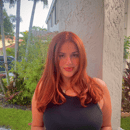Being in college and worrying about my fertility and the possibilities of endometrial cancer is not how I envisioned my 20s to go. My PCOS diagnosis was a journey that felt, and quite frankly, still feels, never-ending. PCOS stands for polycystic ovary (or ovarian) syndrome, and it’s a hormonal disorder that can be treated but not necessarily cured.
I encourage you to get more information from a medical website (I recommend the Mayo Clinic).
The most intricate part about this disorder is that every woman can have different symptoms. Those symptoms can also be related to other health issues, hence, the tricky diagnosis process. I want to share my personal experience because the one thing that has made me feel better about myself throughout this entire process has been the support groups. Hopefully, sharing my side of things will make at least one woman feel accompanied and supported.
Diagnosis
I have been going to the doctor regarding hormonal issues since I was about 14 years old. It started as a perplexing process to try and figure out why my period would be highly irregular; I’m talking once every six to eight months. After being told to wait a couple of years for my body to fix itself, I was left with the impression that my body had to get used to menstruating. At around 16 years old, I went to an endocrinologist and left even more confused than I went in. Once again, the doctor told me that something was off, but they did not know what it was.
After the endocrinologist, my physician prescribed me these awful pills that were supposed to help me regulate my period while restricting my metabolism because that was also out of order. This did not make sense to me, and I felt trapped in my own body, so I stopped those pills and continued searching for answers.
When I turned 17, I went on birth control for the first time because of Accutane, and my period became regular. Being the overthinking and anxious person that I am, I could not continue with my life until I received a clear answer as to why my body was not functioning correctly in other ways. I went to my gynecologist and begged for acknowledgment because I knew something wasn’t right. After some blood tests and an ultrasound, she looked at me and casually said, “Well, yeah, you have PCOS. It’s actually quite obvious that you have it.”
At that moment, I felt relieved that there was an explanation, but I also felt betrayed because if it was so obvious, why was I not told before? Did the doctors disregard my concerns because I was so young? Did they care at all? Has it been worsening every year? Bizarrely, I did not panic, but I simply muted everything out. I heard the doctor speak to me, but I chose not to register what she was saying because I was trying to comprehend a million different things at once.
My brain brought me back to reality once I heard her say, “We have to diminish your possibilities of endometrial cancer.” I remember I looked over at my mom, and every frightful and unpleasant thought was going through my mind as I sat under the room’s fluorescent lights, staring blankly. Since PCOS is way more common than people realize, my doctor had every suggestion possible. I stayed on the birth control pill for personal reasons and later changed my method to the hormonal IUD. Essentially, birth control helps regulate my hormones, and due to some scientific explanation, it lowers my risk for endometrial cancer. After four years of doctor visits, I got my answer, but unfortunately, it did not stop there.
My Life Now
PCOS is something that I will have to live with for the rest of my life, so I prioritize educating myself every day on how to properly take care of my body. I want to preface this by stating that I am not an expert and PCOS treatments vary for every woman; this is simply MY experience.
Thankfully, the primary treatment is birth control, and I made sure to take care of that as soon as possible. Fueling my body the right way is essential for my symptoms not to worsen. I follow an Instagram page ( @healthypcos_) that gives fantastic and straightforward meal recommendations for women with PCOS. My main goal in the food I consume is to avoid high-carbohydrate meals and make sure I incorporate lots of vegetables, protein and healthy fats. As someone who struggles with body image and my relationship with food, I try to avoid the word “diet” when explaining this because I try and look at it as me taking care of my body to fix its function rather than looks.
As soon as I started to build a steady meal plan, I noticed a difference immediately. My constant bloating and cramps decreased, and I feel a sense of pride in listening to my body and giving it what it needs. With that being said, exercise is also essential. Like food, exercise as a woman with PCOS is personalized, but the general recommendation is resistance exercise and walking—lots and lots of walking. Something that helps me stay as active as possible is forcing myself not to park in the nearest garage on campus, which forces me to walk. I am also a huge 12-3-30 fan (the girls that get it, get it). There are days when my energy levels are deficient, and I don’t feel accomplished, but I have to remind myself that it is not my fault and it is okay to give my body the rest it is asking for.
PCOS also affects my sleep and energy, making me lethargic all day, but I cannot sleep at night. I have not been able to control this yet, but melatonin gummies, incense and sleep sounds help create a more relaxing environment in my room.
The possibility of having fertility issues is something that every woman with PCOS must face, but I have forced myself not to dwell on it quite yet. There are times when I start to think about my future, and my anxiety kicks in when I think about having to undergo fertility treatments. I am allowing myself to push that thought into the back of my mind because I am only 20. Nurturing that anxiety is only damaging.
At the beginning of my PCOS journey, I felt ashamed and unable to control my own body. Through research, trial and error and finding different support outlets, I can maintain a stable and realistic routine that keeps my physical and mental health in check. My goal in writing this is to be someone’s support system and be that person to educate others about a common disorder that does not get mentioned enough.
Want to see more HCFSU? Be sure to like us on Facebook and follow us on Instagram, Twitter, TikTok, YouTube and Pinterest!


